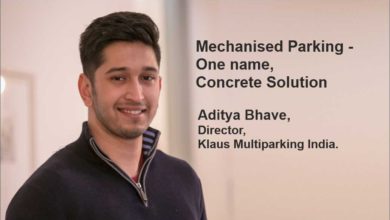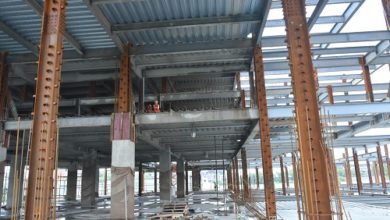Car Parking Management: A Challenge for City of Mumbai
 Parking is turning out to be a major issue in a metro like Mumbai where more than 50,000 cars are added every year besides motorcycles, tankers, school buses and commercial vehicles. According to traffic studies, Mumbai currently has day parking space for only 3.3 lakh of its 22 lakh cars. The parking space in Mumbai has already reached their saturation point. Faced with a geography where land is restrained, the only way to resolve this problem is to discourage private vehicles by encouraging people to use public transports. Such practice is quite prevalent in developed countries where people willingly prefer public transports to private ones.
Parking is turning out to be a major issue in a metro like Mumbai where more than 50,000 cars are added every year besides motorcycles, tankers, school buses and commercial vehicles. According to traffic studies, Mumbai currently has day parking space for only 3.3 lakh of its 22 lakh cars. The parking space in Mumbai has already reached their saturation point. Faced with a geography where land is restrained, the only way to resolve this problem is to discourage private vehicles by encouraging people to use public transports. Such practice is quite prevalent in developed countries where people willingly prefer public transports to private ones.
Brihanmumbai Municipal Corporation (BMC) has recently passed the much-awaited parking policy for the island city Mumbai and its suburbs. The civic body is set to implement a graded pay-and-park scheme with a much calibrated approach
Brihanmumbai Municipal Corporation (BMC) has recently passed the much-awaited parking policy for the island city Mumbai and its suburbs. The civic body is set to implement a graded pay-and-park scheme with a much calibrated approach. The new policy on public parking and on-street parking, has revised the rates upward by as high as high 300 per cent. In case of two-wheelers, these rates have gone up by whopping 650 per cent. Besides, it has banned paid parking within 100 meters of educational institutions and introduced permits for housing society residents for street parking. The proposed residential parking rate for the island city — Colaba to Mahim – has been set at a steep Rs 1,800 a month per car. The corresponding rates for western and eastern suburbs are Rs 1200 and Rs 600 per month per car.
Under the new policy, the pay and-park bays have been divided into three categories — A, B and C. The more congested areas are covered in ‘A’ category and the charge here is the highest at Rs 60 per hour. The parking fee in ‘B’ category areas would be Rs 40 per hour and in ‘C’ it will be Rs 20 per hour. Earlier, the BMC charged Rs 20 per hour across the city, including the suburbs. Parking lots in Colaba, Nariman Point and Bandra-Kurla Complex fall in ‘A’ category. Interestingly, parking has been made free at Girgaum and Juhu chowpatty and Gateway to boost tourism and parking rates will fall on Sunday and public holidays. The parking policy has mentioned that the new charges would lead to decongestion, especially in south Mumbai, as it will discourage too many vehicles plying on the roads. The new policy is aimed at encouraging people to use public transport.
Even as the policy has already been delayed by a year, it will be implemented on a pilot basis for three months in A-Ward followed by all the wards in the city. In other words, the policy will cover other areas depending upon the response it generates in A ward.
In the residential parking scheme, locals can park their cars on roads from 8 pm to 8 am after a monthly payment to the BMC. Only one slot will be available per car owner and housing societies will have to get in touch with the local ward office to put the scheme into practice. Housing societies will have to apply to the ward officer. Each flat-owner will get one slot, while multiple slots will be allotted depending on the availability of space. However, this scheme has not that well with the residents who will make sure that once a car owner buys a parking space, it remains available to him at all times and will not be allowed to be encroached upon.
Under the new policy, the civic body has done away with the parking facilities outside educational institutes. The scrapping of pay-and-park facilities outside educational institutes will prevent congestion and allow easy movement of students. There would be no pay-n-park within a 100 meter radius of schools and colleges as there are school buses. In a calibrated move, these areas will be freed of parking. Seven parking lots on Mahapalika Marg will be scrapped. These proscribed parking facilities will be available made available on Sundays and bank holidays.
The policy also aims to utilize malls and movie theatres for night parking by residents of the area at a minimal charge. In order to promote public transport, taxis, rickshaws and private buses will be charged one-fourth the new parking rates. So, if it is Rs 40 per hour for cars, it will be Rs 10 for cabs. Also parking on roads in the vicinity of public parking lots (PPL) will cost four times the rate inside the PPL. The city’s first large scale PPL was opened at Apollo Mills in Lower Parel in June last year with a capacity of 650 cars.
While formulating a policy is one aspect, its implementation is crucial. The civic body will have to come up with a concrete framework towards this end. Its ambitious plan to monitor parking spaces is yet to see the light of the day. In an attempt to curb malpractices at pay-and-park lots in the city, the BMC had decided to switch to a web-based system some time back. However, now with the new policy in place, BMC is planning to initially roll out the scheme with civic staff collecting the parking charges in the civic-owned parking lots in A ward and for same is will soon float tenders for handheld devices and software.
The proposed system, first mooted in 2011, would print receipts at civic parking zones via a hand-held device. But after two pilot projects and numerous assurances to launch the system in the last two years, the civic body still has no plan in place to make the payment method transparent. In March 2013, the standing committee had passed an Rs75 lakh proposal for manning parking lots along with security, cash collection and the management of the devices. The civic body wanted to launch the scheme by May that year. But its implementation suffered a setback because of a court case over the reservation of parking lots and the outsourcing of parking lot management. The BMC then planned to implement the system in civic-owned lots, but that too has not been put into practice.
All said and done, there is need to bring about desired transparency and efficiency in the existing system which can ensure a robust mechanism for parking. Moreover, multiple-storey car parks need to come up in more places. Railway stations should ideally have assigned parking space. BMC needs to make it compulsory for every society to give adequate parking slots for its residents. Lately, developers in most of new developments are trying to provide more parking slots for residents. They are keen to use latest solutions and technologies towards this ends. Basements are frequently used as parking space.
Global case studies prove that providing innovative solutions to parking problems and introducing mass transit systems do a lot more than just solve traffic problems. Such solutions also result in increased real estate values in a city, since consumers are willing to pay more for the convenience.
Above all, policy reforms and their implementation are the most effective tools in providing efficient parking solutions and management. In the long run, citizens will need to revise their perceptions about the use of private vehicles and exhibit an increasing preference for public transportation.



